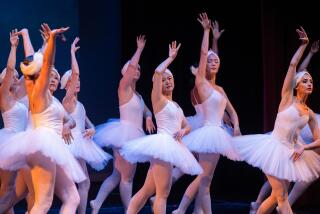WASHINGTON: ONE DANCE AVENUE OPEN FOR BLACKS
- Share via
Los Angeles Contemporary Dance Theater artistic director Lula Washington is in the midst of a crisis. Everick Jones, scheduled to dance a leading role with the jazz-modern ensemble, quit for personal reasons two weeks ago, so the piece he was to perform was scrapped and a substitute work had to be readied for this Sunday’s engagement at the Los Angeles Theatre Center.
Washington, who leads, choreographs and dances in the 11-member company, is dazed by the changes but not daunted. “We haven’t done ‘Blues Portraits’ in a long while, so I have to reteach ‘Uncle Earl,’ a male solo, and ‘Mary’s Daughter,’ a solo I’m too swamped to dance, and ‘Harold and Mae,’ which has to be retaught to two people.
“That’s on top of making sure the music and costumes are right, and rehearsing my own two solos, teaching my two dance classes and my other job--I teach movement at the Nelles Prison (a California Youth Authority facility).”
An exhausting pace, but it’s one long familiar to Washington. As an undergraduate and graduate student in dance at UCLA in the ‘70s, she raised an infant daughter between schoolwork and film, television and concert performances with Donald McKayle, R’Wanda Lewis, Gloria Newman and others.
Choreographing dances all the while, she founded her own company and school six years ago, forming a permanent creative outlet for young black dancers and emerging black choreographers. She also began a “Works in Progress” series (no longer in existence) and the Children’s Jazz Dance Ensemble.
Washington, 35, who coordinated the black dance program for the Olympic Arts Festival in 1984, last year presented about 25 performances and managed her school and two companies, with very little help.
Much of her hectic pace is due to a lack of funds, she says, which she attributes in part to “a lack of faith” by local corporate sponsors toward the local black and multicultural dance communities.
“There are too few performing opportunities for the many emerging multiethnic groups in the city that want to dance here,” she declares. “There should be avenues for these groups to be showcased--where they can be paid.”
This year Washington’s company will receive funds from local foundations and corporations to help match a $6,400 National Endowment for the Arts grant, and Washington will also receive a personal stipend from the California Arts Council.
“But that money is less than a monthly Social Security check,” she says with more than a touch of irony in her voice. “I work seven days a week, 24 hours a day. But for our first few years I didn’t get anything.”
However, all the work she does to maintain visibility in the dance community--writing grant proposals and Xeroxing press releases, in addition to rehearsals, choreography and teaching--is worth it, she insists.
“I like everything I do and if I wasn’t doing this, I don’t know what I’d be doing. And I feel I have something to say creatively with my work that is different from what mainstream black choreographers have to say.”
As an example, Washington cites “Cross the Line,” one work on Sunday’s program. More of a dramatic dance-theater piece than what she calls a pure “dance-dance” work, it is controversial even within the ranks of her supporters, she explains. Also on the program is Jho Jenkins’ “Wauyacanjanga Suite,” a work Washington calls “a fusion of jazz dance, Afro-Cuban, modern and (Katherine) Dunham styles.”
“Sample Suite,” with a jazz score by Joe Sample, is the evening’s sole premiere. Washington says it breaks the pattern of social statements in her work: “This is just a fun piece. It’s dancy, light and humorous. It’s like the Park Avenue dresser as opposed to the Watts dresser.”
Washington never takes her work lightly, however. Through sponsoring master classes by such major figures in black dance as Donald McKayle, Clive Thompson and Pearl Primus, using works by other black choreographers in her repertory and introducing black children to dance, she says she is “trying to keep the dance energy alive in our community. If we don’t do it, I feel deeply that there won’t be anything like this here. There have been others before us, but they haven’t lasted.”
More to Read
The biggest entertainment stories
Get our big stories about Hollywood, film, television, music, arts, culture and more right in your inbox as soon as they publish.
You may occasionally receive promotional content from the Los Angeles Times.










